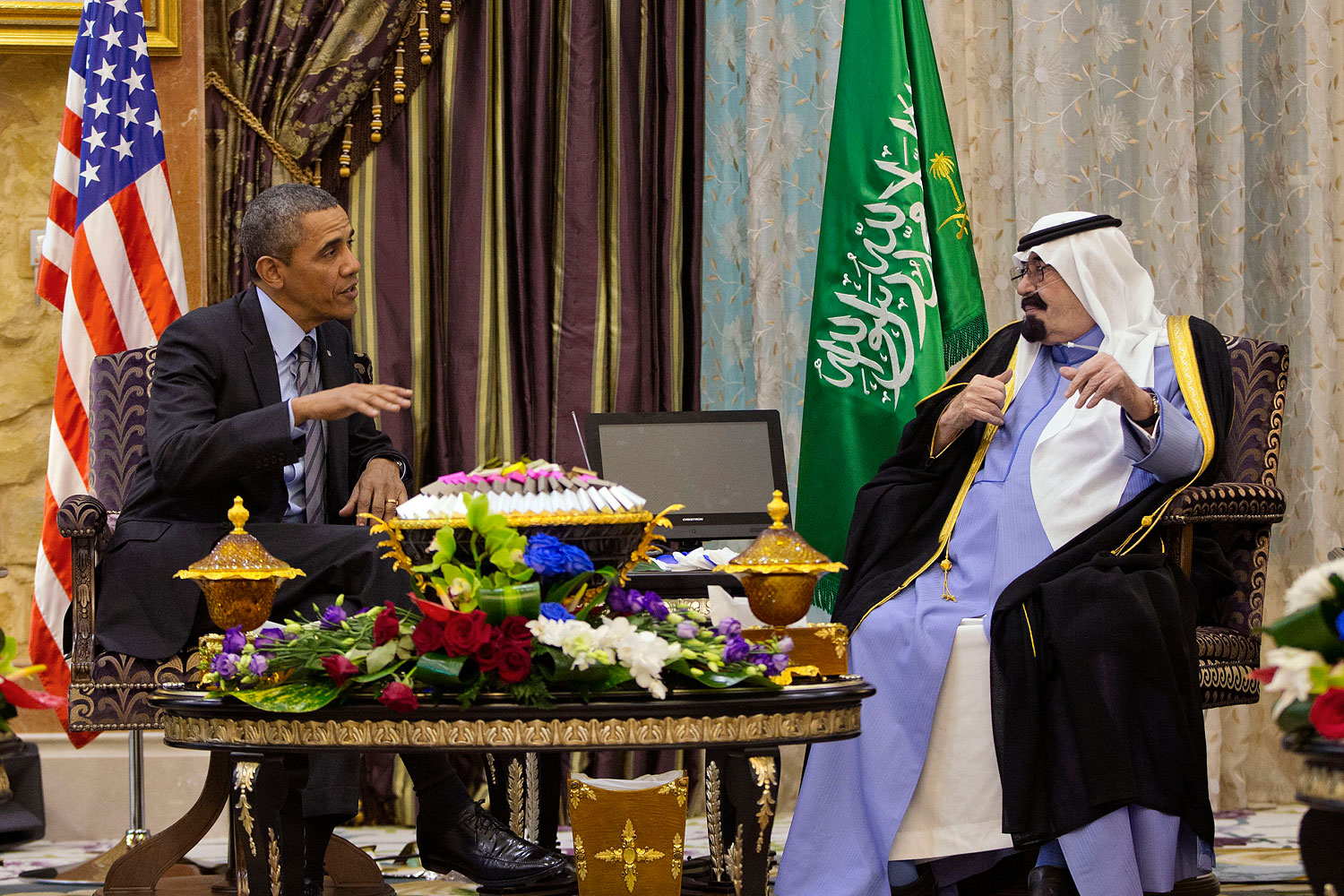
By the time photographers were ushered into the room where U.S. President Barack Obama was meeting Saudi Arabia’s King Abdullah on Friday, both men were seated in armchairs, tucked safely behind a table laden with bouquets and sweets. The leaders had greeted one another in private, avoiding any possibility of repeating the awkwardness that ensued the last time they met in 2009, when the new American President’s deep dip from the waist was interpreted as an obsequious act of deference to a Muslim monarchy Washington has assiduously cultivated for 80 years.
This time, the problem was exactly the opposite. Obama added a stop in Riyadh to his tour of Europe expressly to reassure the Saudis that their desert kingdom still matters. “It’s an opportunity to reaffirm the importance of the relationship,” Ben Rhodes, Obama’s Deputy National Security Advisor, told reporters on the flight from Rome.
For the House of Saud, affirmation is needed on several fronts. In Syria, Obama has declined to back the Sunni Muslim rebels that Saudi Arabia supports with arms and cash, and infuriated Riyadh by failing to order threatened air strikes after hundreds were killed by an alleged Syrian government chemical weapons attack.
In Egypt, the American President both backed away from President Hosni Mubarak faster than Riyadh found comfortable, and offered support to the government elected to replace him, even though it was dominated by the Muslim Brotherhood, a movement the Saudis loathe.
But what most concerns the Saudis is Obama’s courtship of its archrival, Iran. “At the heart of the problem is the White House’s new fondness of Iran,” Fasial J. Abbas, a senior official at the Saudi-owned Al-Arabiya satellite news network, wrote in Gulf News this week. The Saudis regard Obama’s diplomatic efforts to address Iran’s nuclear program through diplomacy as naïve, as well as Obama’s desire to perhaps even coax Tehran back into the “community of nations.”
As the center of Islam’s dominant Sunni branch, Riyadh fought proxy wars against Shiite Iran for decades before the deterioration of state authority in Iraq and Syria brought sectarian identities brutally to the foreground. The Saudis are in deep in Syria, and continue to lobby Obama to supply more formidable weapons to the rebel side, including the shoulder-fired anti-aircraft missiles also known as man-pads. But the administration fears that, given the number of extremists, including al-Qaeda, operating on the rebel side, such weapons could end up bringing down civilian airliners.
“We have made clear that there are certain types of weapons, including manpads, that could pose a proliferation risk if introduced into Syria,” Rhodes reiterated in advance of the leaders’ meeting. “We continue to have those concerns.”
The king and the President spoke for two hours in a palatial hall in Rawdat Kharaim, the monarch’s desert “camp” outside Riyadh. Neither leader made a public statement afterward, but senior Obama administration officials said Iran and Syria dominated the meeting, which one described as “excellent.” Obama emphasized that, whatever their recent differences on tactical approaches, the strategic interests of the two countries remain aligned. There was (unspecified) progress on how best to support the “moderate opposition” in Syria, the officials said, and straight talk on Iran.
“It was important to have the chance to look him in the eyes and explain how determined the president is to stop Iran from getting a nuclear weapon,” one senior U.S. official said after the meeting, ” and how determined the president is to continue to counter Iran’s other destabilizing activities, and that the president and the United States are going into this eyes wide open, there’s no naivete.” .
Abdullah, who is 89, appeared to breathing with the assistance of oxygen, photographs capturing a translucent hose under his nose. The visible infirmity recalled the circumstances of another fence-mending visit by an American President, in the early, still- fragile days of the alliance. In the waning months of World War II, Franklin D. Roosevelt traveled to northern Africa to receive King Abdulaziz ibn Saud, who founded the modern kingdom, on the USS Quincy, in a section of the Suez Canal called the Great Bitter Lake. The monarch was too ill to manage a gangplank and had to be hoisted aboard in a lifeboat.
FDR was failing as well, and the leaders sparred over American support for the Zionist effort that would become Israel. Yet historians judged the meeting a success, noting that the alliance only grew stronger. The verdict on Friday’s session is still out.
More Must-Reads from TIME
- Cybersecurity Experts Are Sounding the Alarm on DOGE
- Meet the 2025 Women of the Year
- The Harsh Truth About Disability Inclusion
- Why Do More Young Adults Have Cancer?
- Colman Domingo Leads With Radical Love
- How to Get Better at Doing Things Alone
- Michelle Zauner Stares Down the Darkness
Contact us at letters@time.com